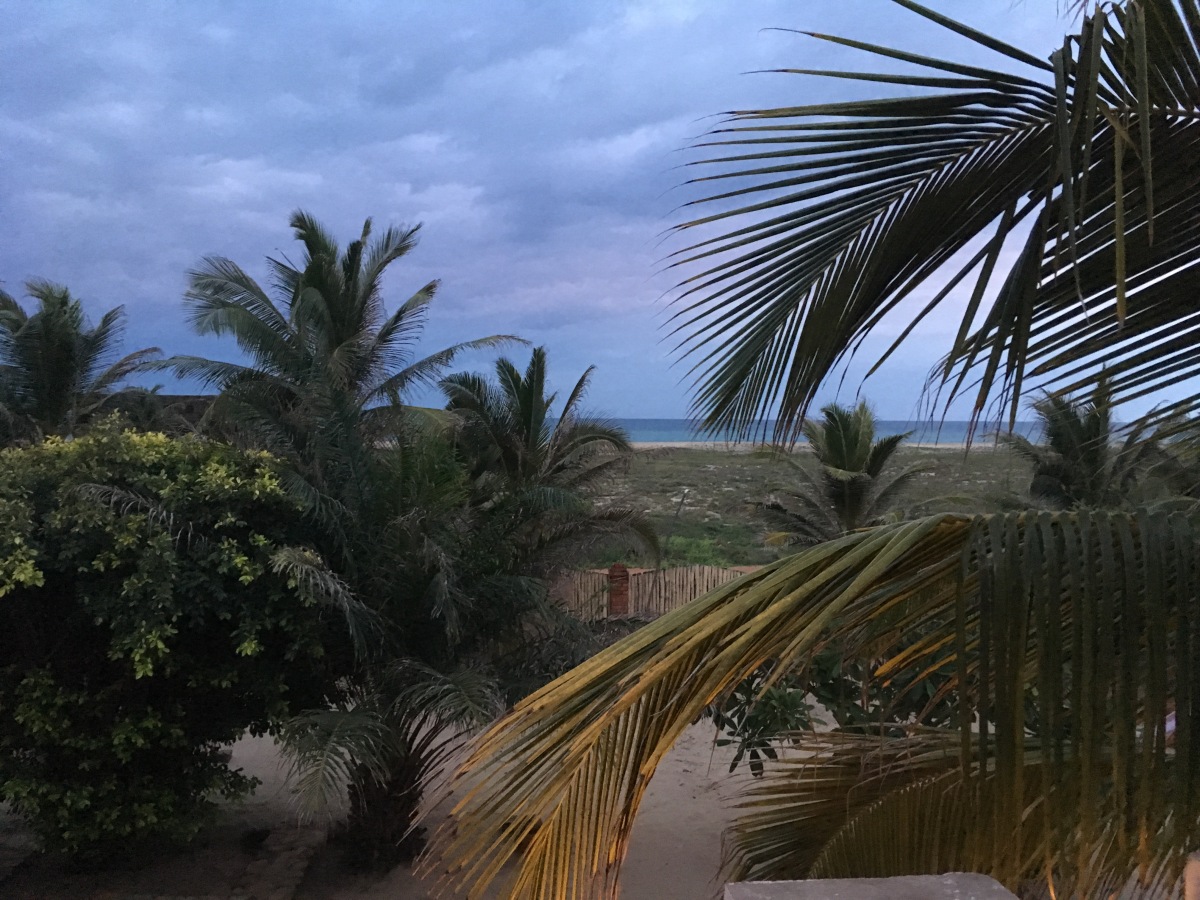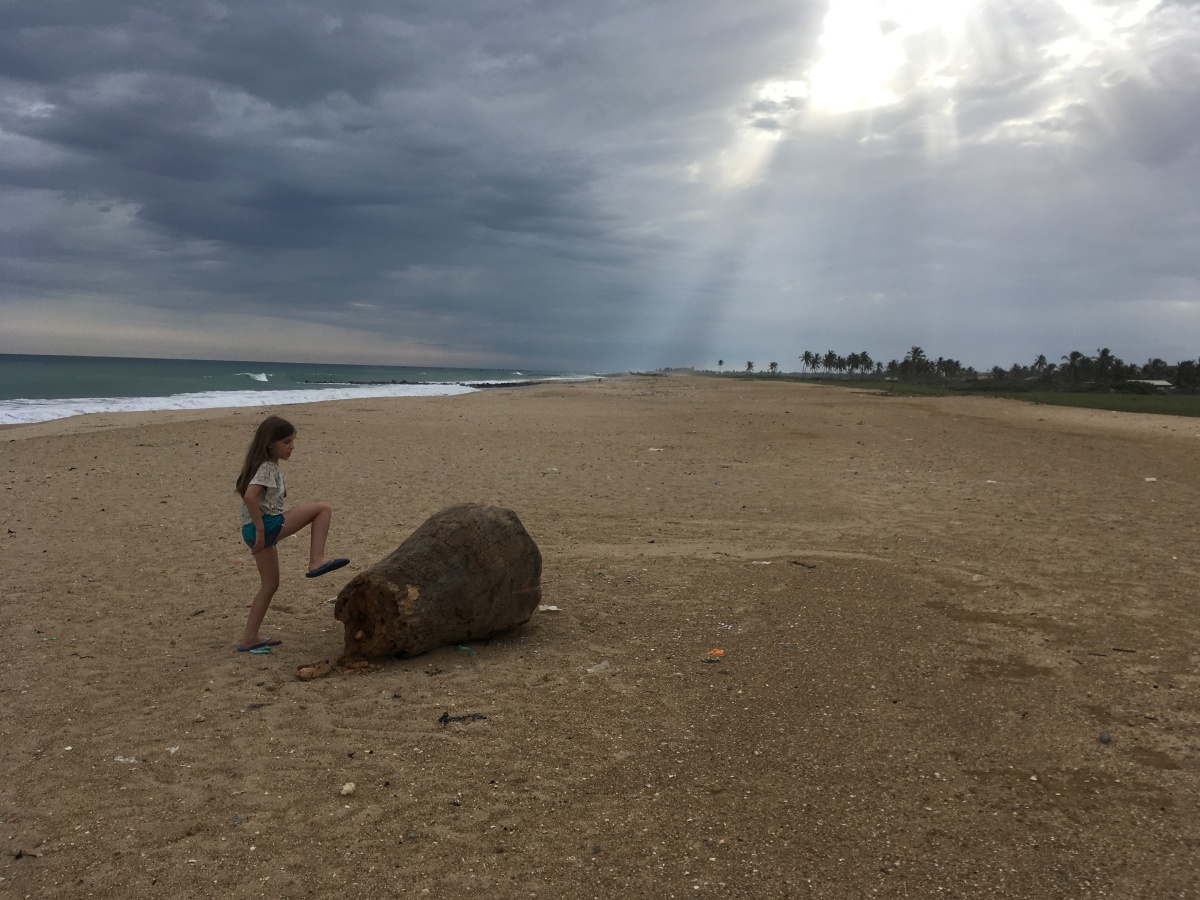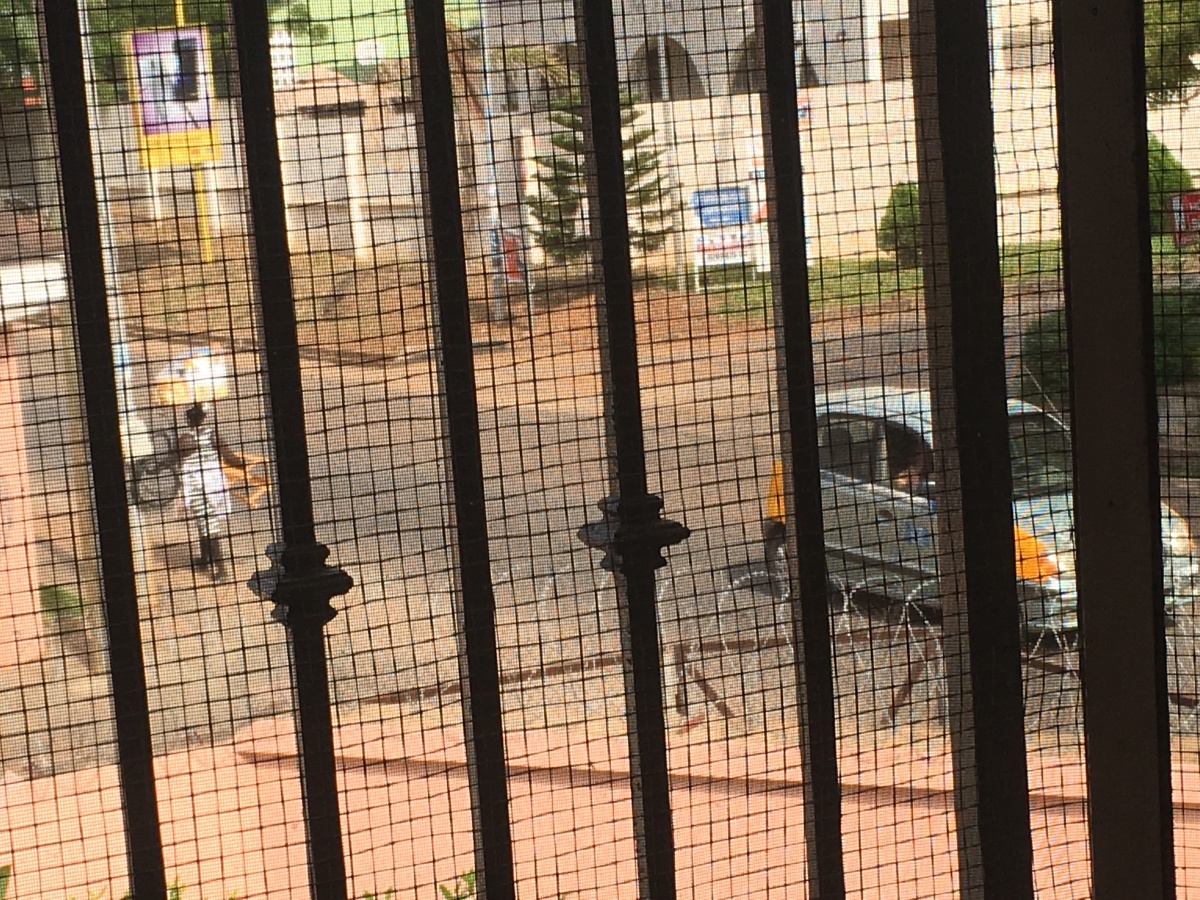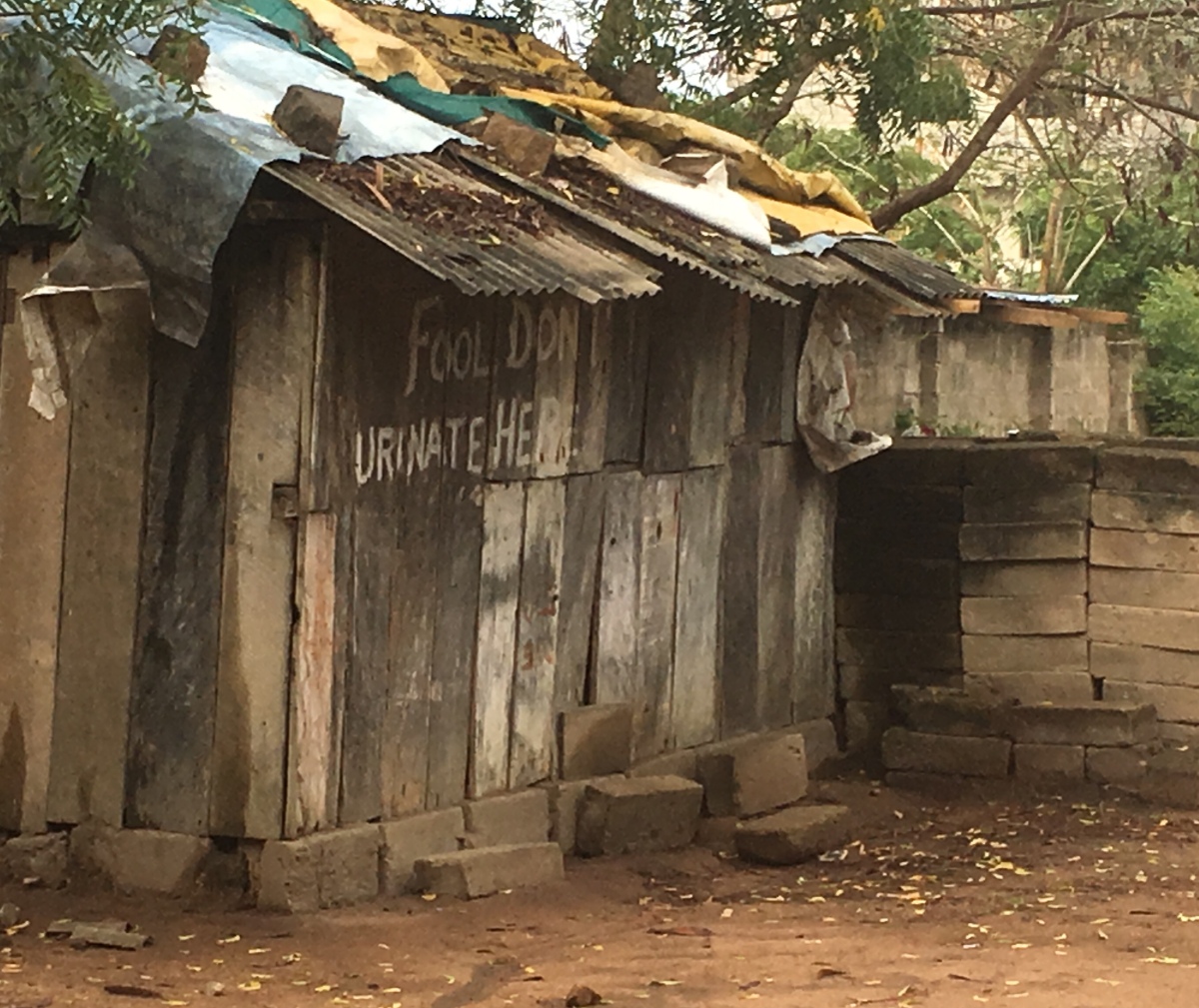Back before my heart and blood conspired to remind me of the folly of counting on plans, Andrés, the kids, and I had a notion to spend Christmas at a guest house down the coast in a little village called Kokrobite. It’s only about 30 kilometers from our home in Accra, but it definitely doesn’t feel anything like the big city. It’s a fishing village with a fairly solid tourist industry, but the tourism it offers is not of the high-end luxury variety. It’s known as a backpacker haven, is frequented by surfers, and also draws a significant population of young local partiers. Bob Marley and Rasta regalia feature prominently in the little tourist shops lining the walkway to the beach, and more than once during our visits there I’ve detected a particular, distinctive odor, also associated with Bob Marley and Rasta, along that same walkway.
So maybe it doesn’t sound like the ideal family vacation spot, but before we even left Mexico we read about this place in a Ghana guide book:
http://www.kokrobitegarden.com
We knew very little about it, but it seemed like it could be a good holiday getaway – not right on the beach, so we could choose when and for how long we wanted to be part of that scene, and self-contained with its own restaurant and pool. We didn’t have a car yet, but Kokrobite is accessible by Uber or taxi. And if we got there and found it wasn’t what we’d hoped, we could always turn around spend Christmas at home instead. (Also, we are the same people who spent one Christmas in a yurt at Abilene State Park and another Christmas in a cabin at swampy Caddo Lake, so this felt like a consistent choice.)
But then, of course, my medevac happened. Given that – at that point – nobody knew what was going on with my heart, the doctor here suggested it might not be a great time for me to be an hour or more* away from Accra without a car at our immediate disposal. So we cancelled our trip. We stayed home and ended up having a lovely Christmas – opened presents around a . . . let’s just say character-filled artificial tree Isaiah and I purchased roadside, and ate a delicious Ghanaian meal prepared by our wonderful house helper, Rose, followed by the most expensive cherry pie I’ve ever baked (cans of tart cherries are available here – for about $10 per can). We watched It’s a Wonderful Life. We enjoyed being together while we could, knowing the next day I’d be leaving for Cleveland. It wasn’t the beach, but we made the best of what it was.
Once I was back from my ridiculous medical sojourn we made it a priority to get to Kokrobite Garden. Although the money we’d prepaid for our Christmas stay had been nonrefundable (a very common policy here) the owners were kind enough to give us a free night’s stay on our post-medevac trip. We loved it so much that before we left we booked a three-night stay for Memorial Day weekend. It would be our real Christmas trip do-over.
Run by an Italian/Spanish couple, Kokrobite Garden is maybe 200 meters from the beach, and is its own little pocket of lush, flowering paradise. The food is delicious, the accommodation simple but comfortable enough, and the atmosphere family-friendly and utterly relaxed. It has its rough edges – there’s no air conditioning in the rooms, although they are generally well-shaded, ventilated, and equipped with fans. There’s no hot water in the shower, though it’s inaccurate to think of the water as “cold” – I have yet to encounter truly cold water coming out of any tap anywhere in this country. It’s very similar to experiences we’ve had in state park accommodations, and at similar prices, but with tasty Italian food, a pleasant swimming pool, and gorgeous tropical foliage.
And on this Memorial Day trip one of Marisela’s dreams came true: friends were there with us. Neighbors from our compound stayed there as well, and although we all enjoyed the conviviality, it was sheer delight for Marisela. While she tolerates traveling with the three of us, she would rather have an entire entourage and this time she had it: our neighbors have three girls, one of whom is in Marisela’s grade and a good friend. She even got to ride there with them and thus avoided both sharing a vehicle with her brother and listening to her parents’ dreadful music (for the record, she is not a fan of ’80s punk/alternative). Marisela and the other girls played in the pool, collected seashells, played card and board games, and built houses for the snails that slid around the gardens (maybe these are normal snails here, but they put the tiny snails I used to find after rains in New Mexico to utter shame).
When we made our reservations we didn’t know if the kids would have Memorial Day off. Andrés, we knew, had Friday the 25th off for African Unity Day, in addition to Memorial Day, and he had totally earned some extended time away from the frantic pace of work, so we planned to stay Friday – Monday regardless of the kids’ schedule. It turned out they didn’t have Monday off, but we gave them Monday off by parental disposition.
The only problem, then, was that Marisela found herself friendless on Monday. The rest of us do not even begin to be companions as entertaining as another fourth-grade girl. But we tried to make the most of things anyway. We ventured out from our little enclave and walked around the village (Andrés and I had explored the village on our last visit, as well, and Isaiah had sometimes accompanied us, but this was Marisela’s first real trip outside the garden walls that wasn’t to the beach). We had a delicious meal of yam and vegetable sauce with fried fish and chicken. It was some of the tastiest fish I’ve ever had.
Accra is a huge city. It’s similar in population to Dallas, where the kids grew up. And we live in a very affluent and well-developed area of the city. Our house is far larger than the house we had in Dallas. We’re down the road from the U.S. Embassy, and surrounded by shops and restaurants that cater to expat tastes and pocketbooks (for example, “Lord of the Wings” is a sports bar between our house and the embassy, with a menu reminiscent of a Chili’s or a Friday’s in the U.S.) It’s still recognizably the developing world: there are roadside shops and fruit/vegetable stands, and things just don’t happen the way people might expect in the U.S. (One example: after a water main broke and was repaired under the major road that goes by our compound and also by the embassy, the street pavement was not repaired. For months. The spot was piled with dirt and rocks to make it semi-navigable, and the dirt and rocks were periodically replenished – sometimes by official road crews and sometimes by entrepreneurially-minded young men who would then urge passing drivers to contribute a few cedis for their efforts. And then, finally, it was repaired. Really, really well, and really quickly. The crews arrived around 7:30 in the morning and were done by noon and the road was perfect.)
My point, though, is that Accra is a modern city. There are shopping malls and supermarkets. There are sports bars and fancy restaurants. And so one of the most appealing things for me about visiting a place like Kokrobite is getting a bit away from the tourist and expat circles and seeing daily life. Just stepping outside Kokrobite Garden and walking anywhere other than along the main drag to the beach presents an opportunity to see a very different side of Ghana.
There are malls and strip malls and shopping centers throughout Accra, but in villages most of the stores are more basic. Here’s a street view from our walk to the restaurant with the delicious veggies and fish:

Clothing and other goods are usually displayed out in the open. I’m surprised, even in Accra, to see that while the merchandise is taken away or locked up at night, these shops often leave chairs, bowls, cooking apparatus, etc. out where they could – theoretically – just be taken away by a passerby. As much as I loved my life and my neighborhood in Dallas, leaving valuable items out and unlocked there was not at all wise.
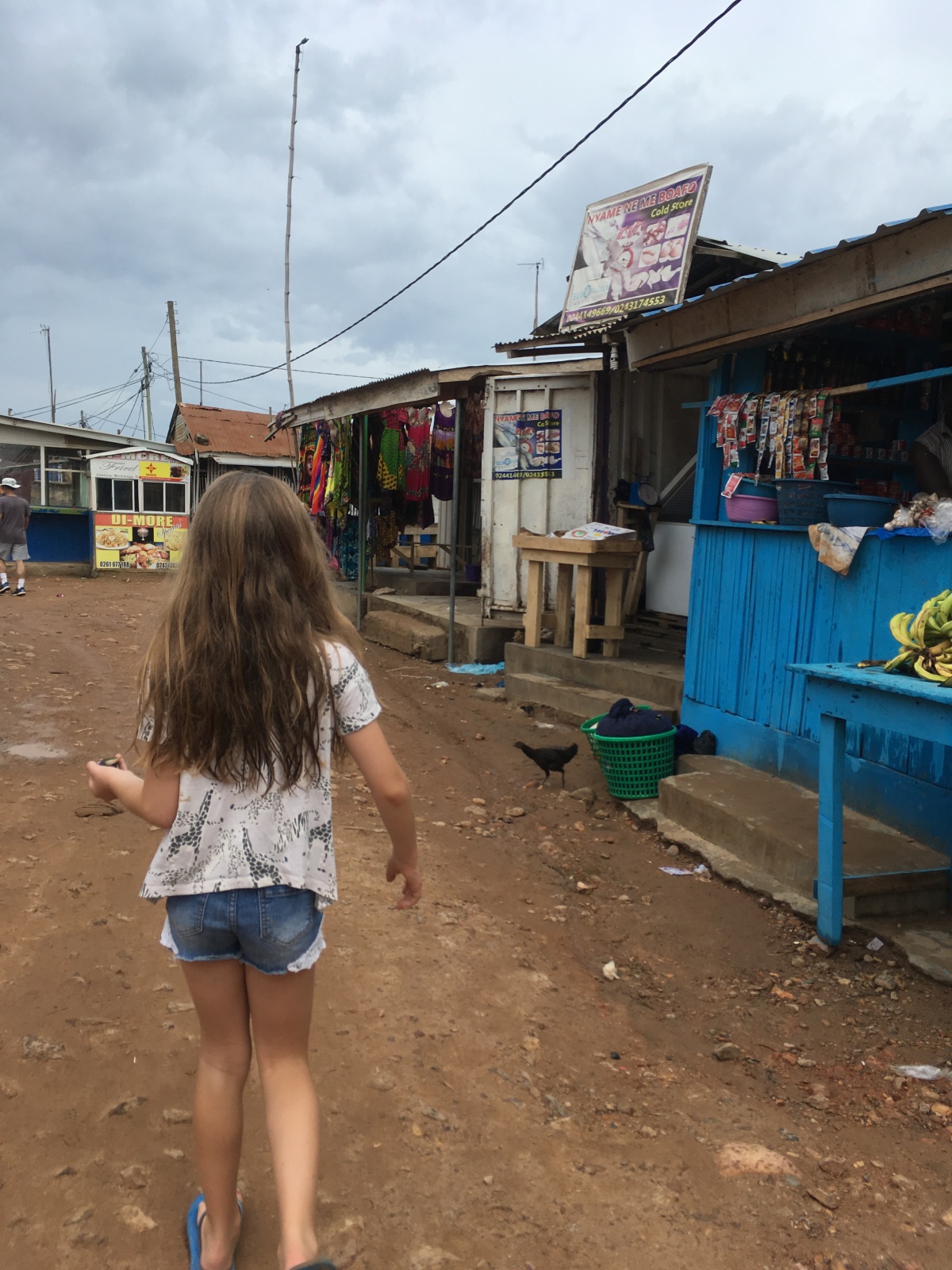
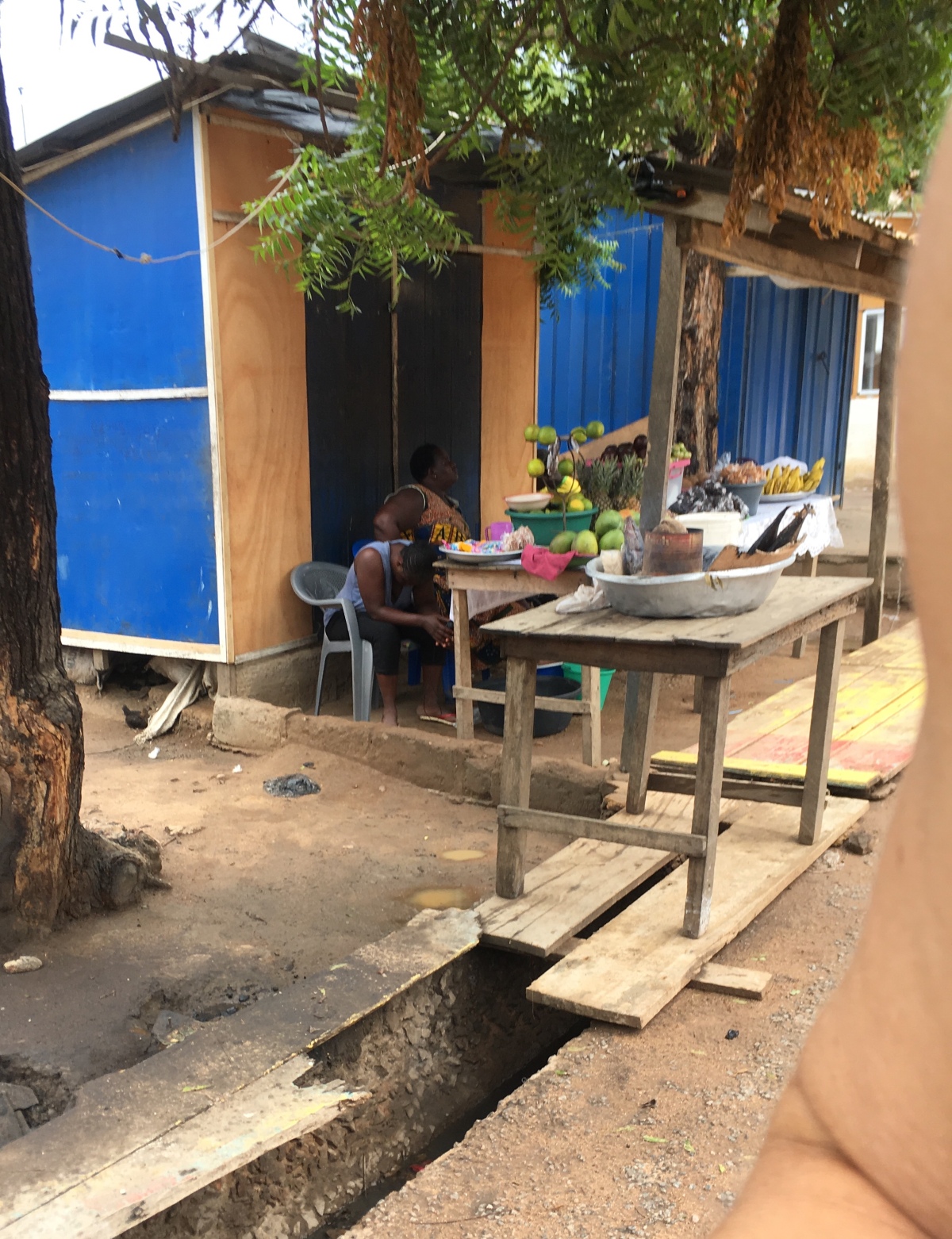
On the way from the main street to the entrance of Kokrobite Garden we pass “Mama Africa Spot,” which we’ve adopted as our main source of provisions during our Kokrobite trips. They have nicely chilled bottled water and plenty of Marisela’s favorite snacks (King Crackers, a nutritionally void packet of crispy white flour nothingness that I try to only let her eat on these outings). Looking straight back in the next photo there’s a view of houses, communal cooking areas, and wood piles for cooking fires (and the Atlantic Ocean in the background!). Right around the corner is a covered area for storing construction supplies where livestock likes to congregate. It’s right beside the communal water tank, so I’m guessing the construction shed is also community property. Marisela and Isaiah enjoy seeing the goats and chickens, although we all find chickens less endearing having discovered that roosters crow not only at dawn, but – if they feel like it, and they seem to often feel like it – all night long. Then we’re back to Kokrobite Garden (on the left in the last picture) and the view reflects the shift – with beach proximity – to a bit more of a Rasta vibe.
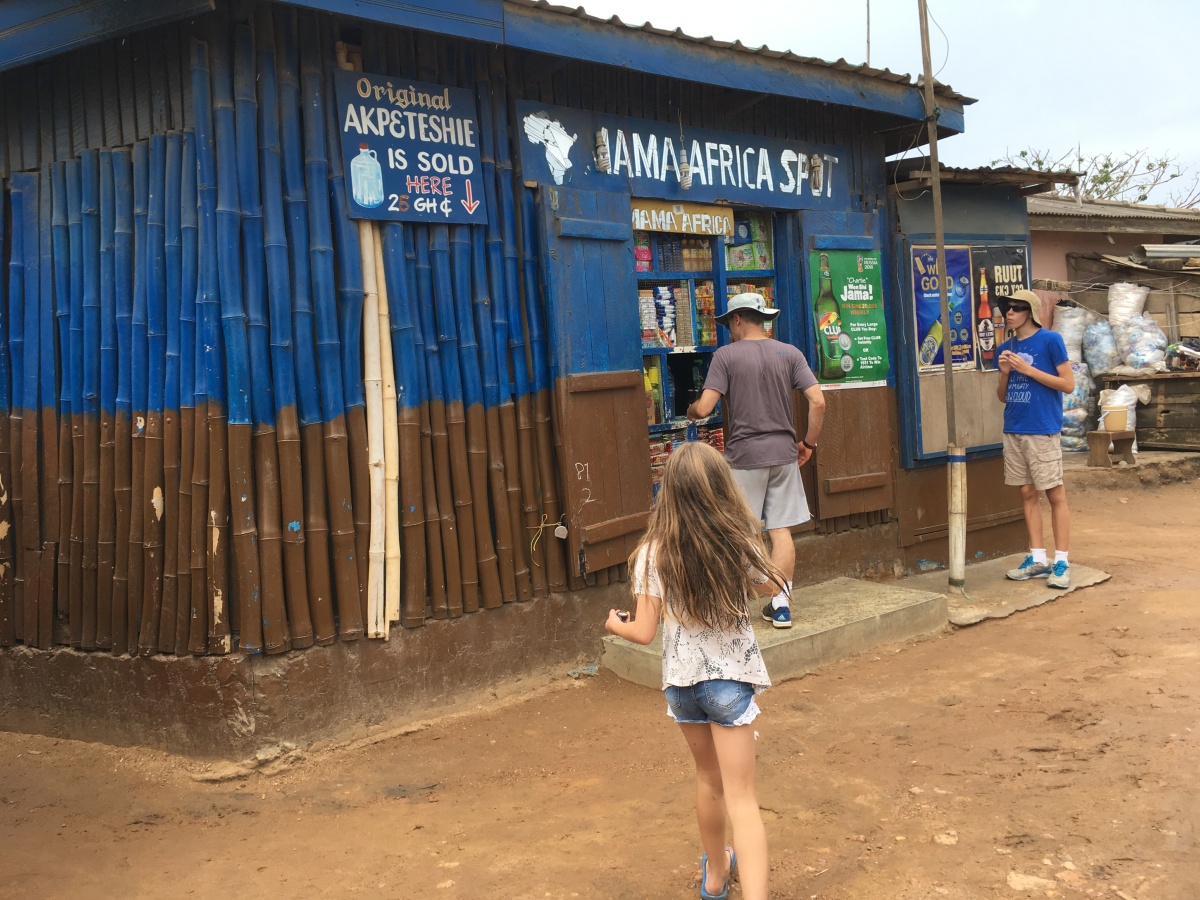
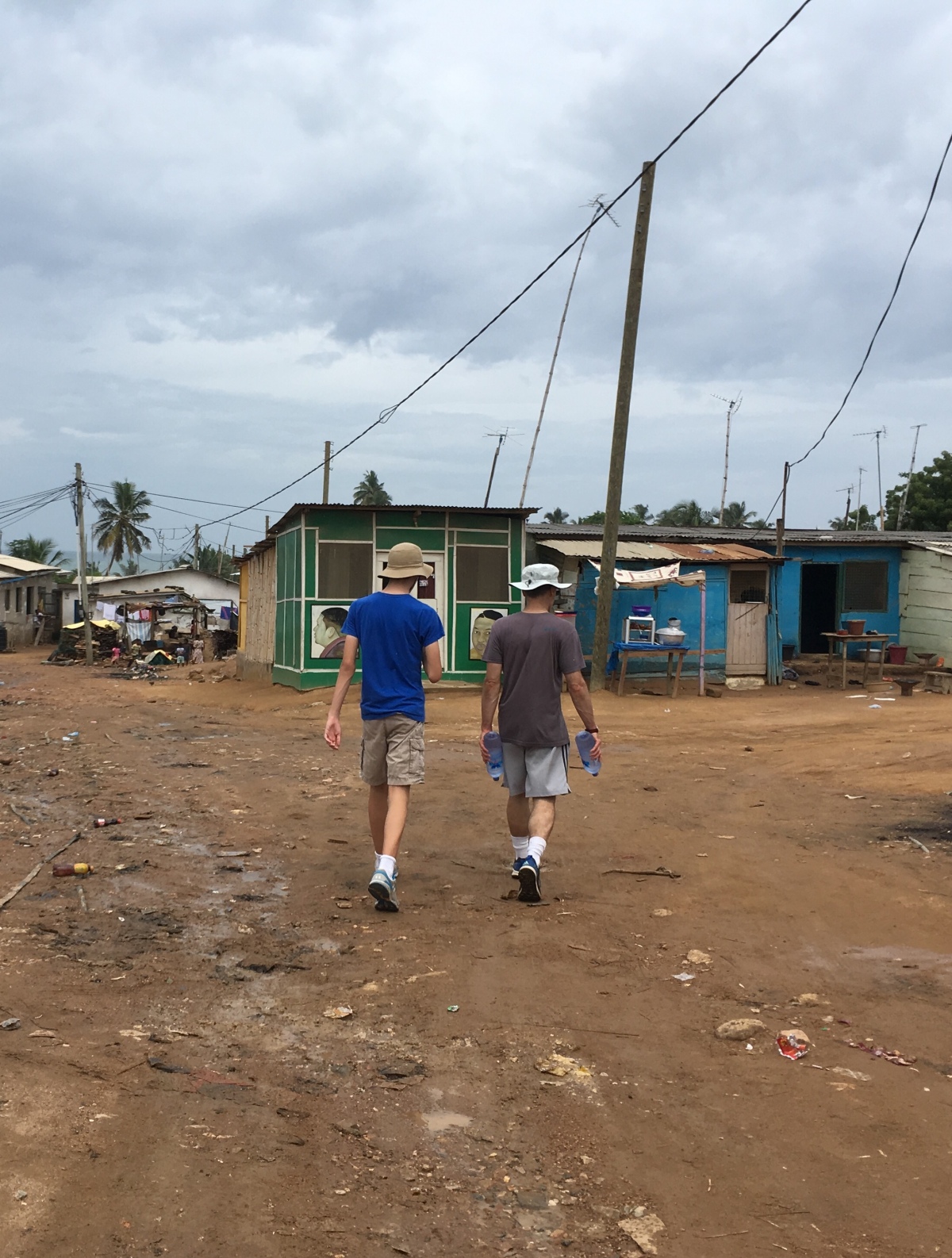
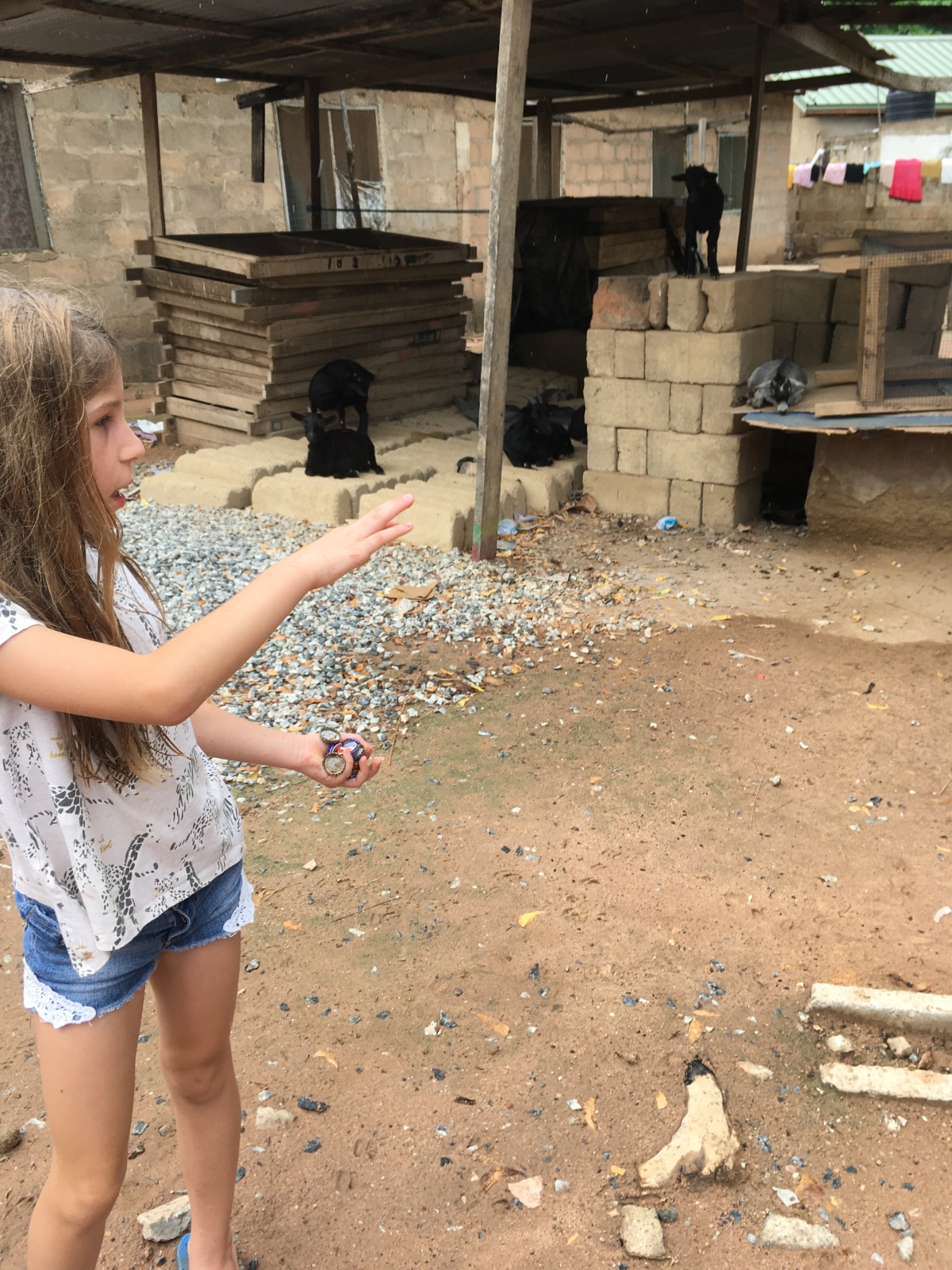
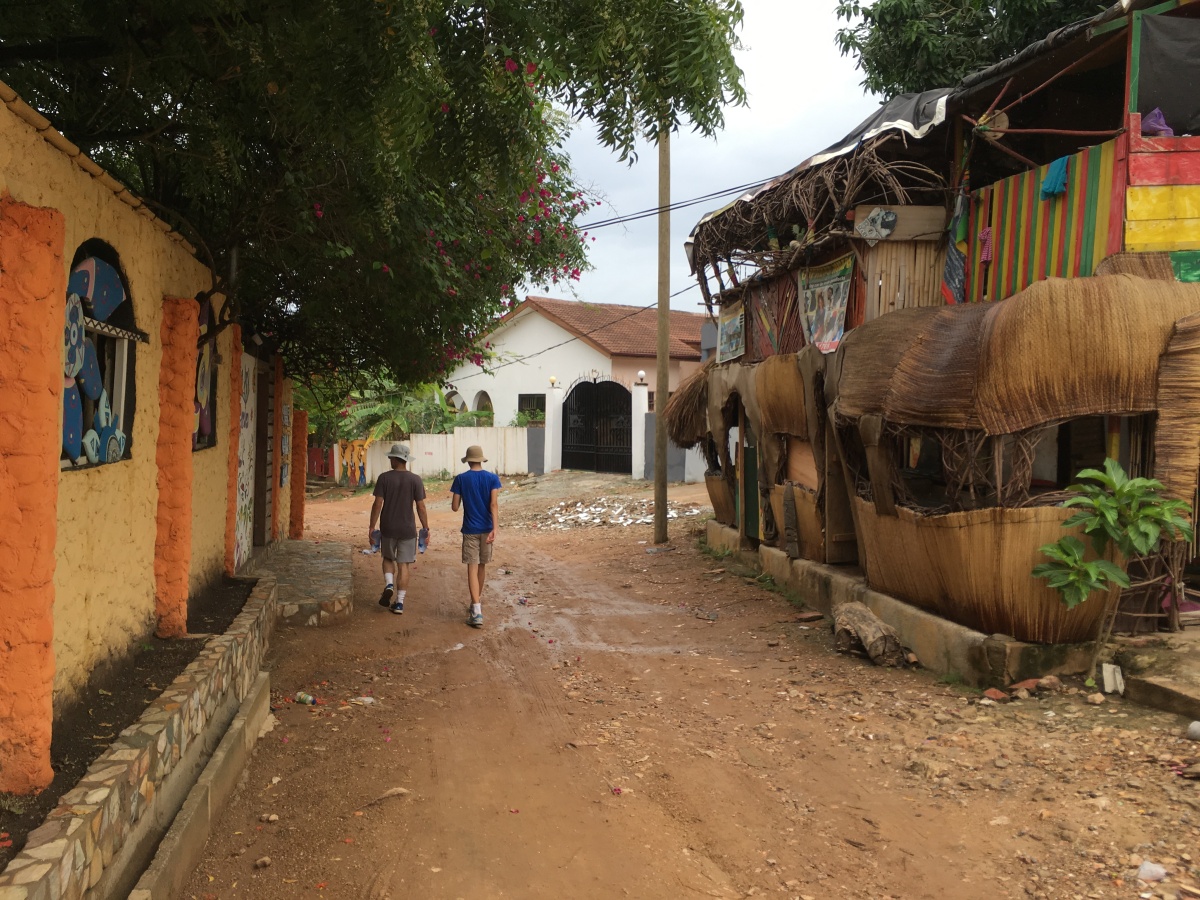
So in the end Marisela survived her day without a friend. She still played in the pool a bit, and waded at the beach. She was even made an apprentice in the renovation work the owner is undertaking – he showed her how he plans the tiled mosaics around the dining area and let her help build them.


We had a lovely time with friends. We had a lovely time exploring. We had plenty of relax and chill time (I never did get to the letters I’d planned to write, but I did almost finish my book). And we all were able to enjoy a belated “Christmas” holiday.
* According to Google Maps Kokrobite Garden is 29 kilometers from our house. A truly good travel time – like the best one could hope for – would be about 50 minutes. The trip out of Accra traverses some very busy areas, including a huge stretch of road lined with markets and trotro traffic (mass transit minibuses, all of which are named. My fellow X-Files fan son and I especially enjoy the one pictured below, but more often the names are religiously oriented. Marisela spotted one on this last trip called “Jesus Is In the Car.”)

A typical trip is maybe an hour. And then there’s the trip back our neighbors had Sunday, and the very similar one we had on Monday, which clocked in at three and a quarter hours. There was a spot where traffic was diverted for road repairs, and the diversion just kind of happens. Lanes shift and are cut down in number and there’s no warning or indication in advance (other than signs that say “CONSTRUCTION 100m.” We made it, though. But we might look in to whether that construction has wrapped up before we head out there again.






